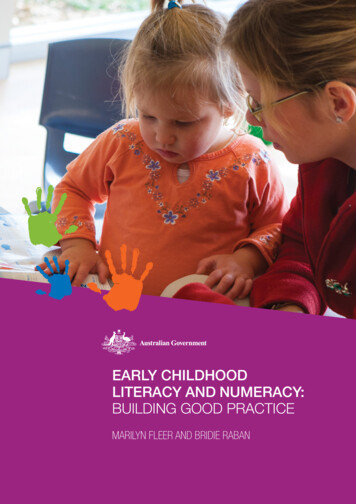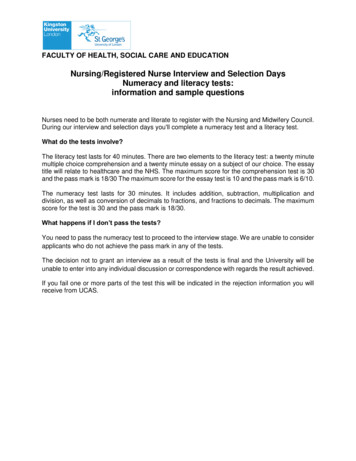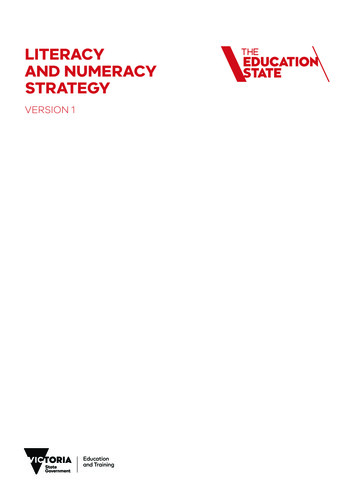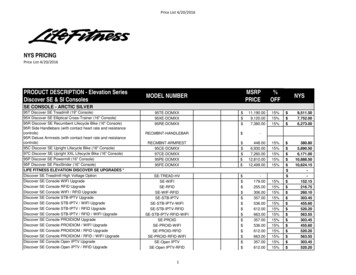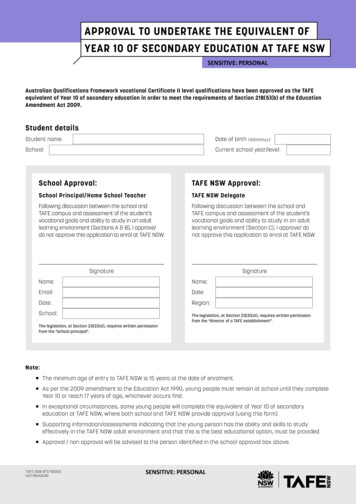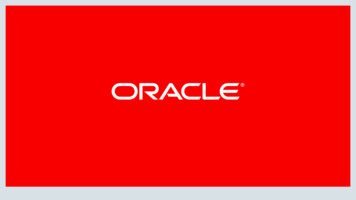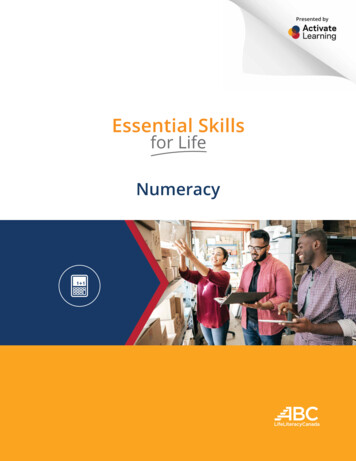
Transcription
NumeracyFounding Sponsor
Copyright 2020 ABC Life Literacy Canada.First published in 2020 by ABC Life Literacy Canada. All rights reserved.Printed in Newfoundland & Labrador.Distributed to organizations across Newfoundland & Labradorby ABC Life Literacy Canada.Supported byActivate Learning is funded in part by the Government ofCanada’s Adult Learning, Literacy and Essential Skills Program.abcactivatelearning.ca
Welcome to Essential Skills for Life!This program helps you build nine essential skills for the workplace and for life:ReadingThinkingWritingOral communicationDocument useWorking with othersNumeracyContinuous learningDigital technologyThese skills are used in nearly every job and in daily life. They also allow us tolearn new skills and to adapt to changes. Improving your essential skills can helpyou to build a good life for yourself.This workshopThis workshop deals with the skill of numeracy, which means being able tounderstand and work with numbers.We use numbers and math every day, like when we count up our overtime hoursat work, go shopping, plan a holiday, or make a monthly budget.In this workshop, we will talk about how and why we use numbers, and learnabout how we can improve our numeracy skills.abcactivatelearning.ca1
NumeracyWhat is numeracy?We sometimes think of numeracy as a skill that only some people use. Butbasic math and numeracy skills are used by everyone.Numeracy is the ability to understand and workwith numbers. We use our numeracy skills whenwe practice math.Our confidence and ability to work with numbers can affect how we handlemoney, shop, and do parts of many jobs. This skill can even affect ourhealth and well-being.Sometimes we can use calculators and apps to do math for us. But it’s stillimportant to have a good understanding of what numbers mean and howthey work.Why is numeracy important?Numeracy helps us with so many parts of our lives.For example, we can use our numeracy skills to: solve different kinds of problems understand our personal finances read and understand instructions build and fix things develop thinking and logic skillsNumeracy skills can make our lives easier,and help us with many activities that we doat work and at home.2abcactivatelearning.ca
NumeracyNumeracy in daily lifeHere are some examples of how we use numeracy skills in everyday life: When we measure the doorway to make sure a new couch will fit through it When we count the coins we need for bus fare When we make a schedule for our time at work When we manage our medications and calculate a dosageActivityRemember, we use our numeracy skills whenever we work with numbers. Workwith a group to figure out how you might use numeracy skills in these situations:Planning yourweekly runFollowing andunderstandinga basketball gameFilling out yourtime sheetat workCooking a mealBuying a used carabcactivatelearning.ca3
NumeracyNumeracy and youActivityWhat does having good numeracy skills look like? What does it feel like?Write your ideas below. Looks like:Feels like:Ask yourself Think about what you wrote above. How do your numeracy skills compare to what you wrote on your list? I s it important for everyone to have the exact same numeracy skills? Why,or why not? W hat would you be able to do—that you can’t do now—if you couldimprove your numeracy skills?4abcactivatelearning.ca
NumeracySelf-assessmentHow are your numeracy skills? An honest assessment will help you to understandyour strengths. It will also help you decide what you’d like to work on.ActivityI’m pretty good at math. I can add, subtract, multiply, divide, use acalculator, and use other numeracy skills when I need to.I’m good at everyday math. Things like measuring and counting arenot so hard. But I find it hard to do more complicated calculations.I’m not very good at doing math in my head. But I can do simplemath with the help of a calculator or app.Math is really hard for me. I only do it when I have to.Even thinking about working with numbers makes me anxious.None of the above. Here’s my situation:abcactivatelearning.ca5
NumeracyWhat makes numeracy hard?Is numeracy hard for you? If so, you’re not alone. Many people find tasksthat involve numeracy difficult.Meet AkiAki has never liked math. When he was younger, his teacher yelledat him in front of his classmates after he made a mistake on his timestables. He remembers feeling ashamed. Ever since, he’s tried to avoidusing his math skills.Part of what makes numeracy hard is that some people have negative feelingsabout it. People who have had bad experiences with math can develop mathanxiety.Math anxiety is when math makes you feeluncomfortable, nervous, or scared. If you avoid usingyour numeracy skills, you might have math anxiety.People with math anxiety feel stressed about working with numbers. Sometimesthey feel hopeless, like there’s nothing they can do to get better at it. Buteveryone can improve their math and numeracy skills.Let’s talk about itMath anxiety is just like any other fear. It takes effort and hard work, but youcan overcome it. What advice would you give someone trying to conquer a fear? Could that same advice work for math anxiety?6abcactivatelearning.ca
NumeracyLet’s look at some other things that make numeracy hard: M ath is basically another language. There are so many different termsto know. If we don’t understand them, it becomes very hard to use ournumeracy skills. It takes time to learn the language of math, but if you’repatient, you can do it. W e all move at different paces. Some people understand numeracyeasily and can learn quickly. Many people who learn numeracy at aslower pace fall behind in school, and they never have a chance to catchup. But slower learners can still have strong numeracy skills. I n most cases, math doesn’t have grey areas. You’re either right, oryou’re wrong. Most of us don’t like being wrong, and that’s one reasonwe might avoid or struggle with math. But being wrong isn’t a bad thing.Making mistakes is part of learning.Ask yourself.Think about your experiences with numeracy. Have you ever struggled with any of these parts of numeracy? Can you think of anything else that makes numeracy hard for you?An important part of improving your numeracyskills is understanding what makes it hard foryou. Once you know what challenges you’reNumeracy Tipabcactivatelearning.cafacing, you can make a plan to overcome them.7
NumeracyDifferent types of numeracyIn this workshop, we will look at four kinds of numeracy that we use ineveryday life: Measuring Estimating Managing money Analyzing dataSome people can do all of these things well. Others are good at some types ofnumeracy, but not others. You might be very good at measurement, but not sogood at managing money. It’s normal to have strengths and weaknesses.We all have different lives, and some numeracy skills might be more importantto us than others. For example, you might realize that being good at estimatingis more important in your life than analyzing data. We’re all different, andthat’s ok. The important thing is that you develop the numeracy skills that youneed for your own life.8abcactivatelearning.ca
NumeracyMeasuringWe use measurement every day. Weighing tomatoes in a grocery story,measuring the length of a fence, and checking the temperature outside are allexamples of measurement.Measurement is the process of checkingthe size or amount of something. We canmeasure many things, including size, weight,distance, time, temperature, and speed.?Why do we measure?Measurement helps us answer questions like: How big? How hot? How much? How heavy? How far? How fast?When we measure, we can also use what we’ve learned to compare two ormore options. For example, if you’re shopping for a dresser, you might measureeach dresser you like so that you know how much space it will take up in yourroom, then pick the one that works best.Let’s talk about itThink about the measurements below:1. The speed of a car on the highway2. The number of eggs needed for a recipe3. The amount of time it takes to get ready for workWith your group, discuss: Why is it important for us to be able to measure these things? What could happen if we measured any of these things incorrectly?abcactivatelearning.ca9
NumeracyHow do we measure?The process of measuring something might seem complicated, but followingthese steps can make it easier.Step 1: Decide what you’re measuringStep 2: Figure out what unit of measurement to useStep 3: Choose the tool you’ll use to measureA unit of measurement is a standard term that weuse to explain an amount. For example, a kilometeris a unit of measurement that explains distance.Here are some of the different types of measurement we use. Look at theunits of measurement and the tools we can use for each one.10Type ofmeasurementExampleUnit ofmeasurementTool formeasuringSize (height,width, depth)Furniture,walls, gardens,doorwaysCentimetres,meters, inches,feetMeasuring tape,rulerWeightFruit, meat,our bodiesMilligrams,grams, poundsScaleDistanceDriving routes,walking routesMetres,kilometres, feet,yards, milesOdometer,pedometerSpeedCar, boat,airplane, runnerKilometres perhour, miles perhourSpeedometerAmountWater, milk, rice,flour, laundrydetergentMillilitres, litres,pint, gallonsMeasuring cup,teaspoonTemperatureOven, weatheroutside, ng.ca
NumeracyOften, our tools do the measuring for us. For example, your speedometer tellsyou exactly how fast you’re driving your car. A measuring tape will show youhow tall you are. But for some more complicated types of measurement, you’llneed to use a calculation. There are different calculations that you can usedepending on what you’re measuring. Here are a few common ones:Area:You calculate the area when you need to know the size of a surface. For example,if you need to know how much carpet to buy to cover your bedroom floor, youcalculate the area.To calculate the area, multiply length by width(length width)lengthwidthPerimeter:You calculate the perimeter when you need to know how long the outside edgeof a surface is. For example, if you need to know how much fence to buy to goaround your backyard, you calculate the perimeter of your backyard.To calculate perimeter, add up the length of each side(side 1 side 2 side 3 side 4)side 1side 4side 2side 3abcactivatelearning.ca11
NumeracyMeet ShaniceShanice is a landscaper. She’s working on a garden for one of her clients.She wants to protect it by wrapping chicken wire around the outside edge.She already knows how big the garden will be. But she isn’t sure howmuch chicken wire she needs to buy to surround it. Have a look at whatshe’s done so far:Side 1 3 metersSide 4 2 metersSide 2 2 metersSide 3 3 metersActivityWork with a partner or a group to help Shanice with this task. What is Shanice measuring? What unit of measurement is she using? What tool can she bring to the store to measure the chicken wire? W hat calculation can Shanice use to find out exactly how much chickenwire she needs? How much chicken wire does she need? Why was measurement important here? How could measurement behelpful to you in your life?12abcactivatelearning.ca
NumeracyEstimatingWe estimate almost every day. It’s a helpful skill that can make our lives easier.Estimating means making a guess toget an answer that is almost correct.Here are some things we estimate. Time: How long does it take me to finish a task at work? Money: How much money do I need for weekly groceries? Size: What size pants do I need to buy for my child? Amounts: How many socks do I need for my camping trip?Why do we estimate?Estimating is a quick way for us to get a pretty good answer without spending alot of time figuring out the exact answer. Imagine you’re grocery shopping for afamily dinner. It would be hard to figure out exactly how much food you need,but you can make a good guess.ActivityEstimation is a useful tool, but it’s not always appropriate. Sometimes we needto know the exact answer.Work with a partner to decide whether it makes sense to estimate these things: How much insulin your mother needs The temperature outside How much milk you should put in your coffee How much money you owe to your landlord for rent and utilitiesHow can we know when we should use estimation, and when it would be betterto figure out the actual amount?abcactivatelearning.ca13
NumeracyHow do we estimate?There is no right or wrong way to estimate. Everyone does it a bit differently, andthe amount of time you spend estimating might depend on the situation. But hereare a few tricks you can use to improve your estimating skills. U se information you already know. If you’re estimating how long it takesyou to walk to the bus stop, think about how long it’s taken you in the past. B reak down bigger tasks into smaller ones. If you want to estimate howmuch wood you need to build a shed, think about how much wood you needfor the walls, the foundation, and the doorframe. Use rounding. Rounding is one way to make numbers easier to work with.If you’re trying to figure out how much your dinner bill will be, round thecost of your drink, meal, and dessert to make it easier to add them up.Rounding means changing a complicatednumber to make it simpler, while keeping itclose to the actual amount.Rule for roundingWhen rounding numbers, look at the last digit of a number. If the last digit is less than 5, round down. For example, you wouldround 172 down to 170 If the last digit is 5 or more, round up. For example, you wouldround 179 up to 180A digit is any single number from 0 to 9.In the number 692, the digits are 6, 9, and 2.14abcactivatelearning.ca
NumeracyMeet LeonLeon is house painter. He just got a call from a client asking him to paintthree bedrooms in their house.Before Leon says yes, he needs to know: How much paint does he need to buy? How long will the job take? How much should he charge for the paint job?Let’s talk about itEstimating can make Leon’s job easier. W hat information does Leon already know that could help him to findthese answers? H ow could Leon make this task easier by breaking this big task intosmaller ones? How could Leon use rounding to make the numbers easier to work with? W hy is estimating helpful for planning this job? Why do you think Leonchose to estimate instead of figuring out exact amounts? How could you use estimation in your life? What about at work?abcactivatelearning.ca15
NumeracyManaging moneyWe use money almost every day. Each time we deal with money, whether it’s athome or at work, we’re using money math.Money math is just what it sounds like: mathand numeracy skills that involve money.?Why do we do money math?Money is a part of our everyday lives. Being able to do money math is importantbecause it helps us manage our money and make smart financial decisions. Whenwe are able to manage our money, life can be little easier.How do we do money math?Using money math can be complicated because there are many ways to do it.For example, you could estimate to figure out how much money to bring forlunch. You could use addition to double check that a bill is correct. Or you coulduse measurement to compare the cost of two insurance plans. You might alsouse subtraction, division, multiplication, fractions, or percentages.You don’t have to manage your money withouthelp. Remember that calculators can be helpfulfor more complicated kinds of money math.Numeracy TipThere are also apps, websites, and programsthat can help you.16abcactivatelearning.ca
NumeracyMeet LilaLila works as a taxi driver. Here are some of the ways she uses moneymath at work and at home: Telling a customer roughly how much she thinks a trip will cost Paying her credit card bill Making change for a customer who has paid in cash Figuring out how much she spent on groceries last month Splitting a bill between two customers Comparing the cost of two different gym memberships Making a monthly budget for herself Figuring out how much she can expect to get as a tip on a ride Doing her taxesLila has many different reasons to use money math. Can you see howshe uses different types of math for each of these activities?Ask yourself.Money math is a part of our daily lives. How do you use money math in your life? Are some types of money math easier or harder for you than others?abcactivatelearning.ca17
NumeracyMoney math can also help you make a plan for spending or saving.Lila is planning a road trip to see a concert. She wants to get an idea of whatthe trip will cost, so she’s making a list of all of the expenses she knows shewill have.An expense is something that you spend money on.ActivityWork with your group to help Lila figure out the cost of her road trip: Estimate the cost of each expense Calculate how much each expense will cost Add up the total cost of the tripExpenseQuantityCost per expenseTotal costGas4 tanks / tank of gas Hotel3 nights / night Meals and snacks4 days / day Concert ticket1 ticket / ticket Total cost of road trip Now that she has an idea of how much the trip will cost, Lila needs to make aplan to save up enough money. The trip is 6 months away. How much should sheplan to save each month?Your answer:18abcactivatelearning.ca
NumeracyWas that activity hard or stressful for you? For some people, money mathmakes them more anxious than other types of numeracy.Meet CiaranCiaran works as a nanny. He has a few clients, but he only works whenhis clients need him. Since he doesn’t have regular work hours, he’snever sure of how much money he can expect to make in any week. Hegets really stressed out when he has to deal with money. Sometimes it’seasier to just avoid dealing with it altogether.Let’s talk about itMoney math is a very useful skill, but it’s also one that some people avoid. W hy do you think that some people find money math more stressful thanother types of numeracy? What problems might come up if you avoid using money math? How can we deal with stress about money math?Tips for dealing with money math stress Remember that you have options. When you need to make apurchase, compare costs and choose the option that’s right for you. Create a monthly budget or spending plan based off your incomeand expenses. When you have a plan for how you’ll spend yourmoney, making financial decisions can be easier. Schedule a weekly check in on your bank account. Ask yourself ifyou’re staying on track, or if you need to make adjustments. Ask for help when you need it. Try booking an appointment withyour bank if you have questions, or reach out to someone you trust.abcactivatelearning.ca19
NumeracyAnalyzing DataUsually when we use our numeracy skills, we get our answer by doing acalculation to find a number. But sometimes numbers can’t tell us the answeron their own. Sometimes, we need to spend time thinking about the numbers tounderstand what they mean. We do that by analyzing data.Analyzing data means looking at information andthinking about it. Then you can use that informationto answer questions and make decisions.?Why do we analyze data?Analyzing data helps us use information to answer questions, find patterns, andexplain things. Here are some ways you might analyze data in everyday life: Thinking about your diet to figure out which foods are giving you heartburn Trying to figure out why your child can’t sleep at night L ooking through your bills to figure why your hydro bill is higher in somemonths than others C omparing your pay stubs to figure out why you’ve been paid less or morethan you expectedLet’s talk about itAnalyzing data can take up a lot of time. Sometimes, we might want to just trustthe numbers. But if we do that, we might miss something important. C an you think of times in your life when it would be helpful to analyzedata? When would you be less likely to spend time analyzing data?20abcactivatelearning.ca
NumeracyHow do we analyze data?Here are some steps to take when you’re analyzing data.Step 1: F igure out what questions you have and what answers you’relooking for. Step 2: Gather information. Research and collect facts, numbers,statistics, or advice. Step 3: C ompare the different types of information you have. Decidewhich ones you think are the best, and which ones you want toignore.Step 4: Use what you’ve learned to answer your questions.When you’re analyzing data, think about yourpriorities. Priorities are the things most importantto you. If your priorities are different than someoneNumeracy Tipelse’s, you might analyze the same data, but havedifferent answers. That’s ok. Different things areimportant to different people.Meet HubertHubert needs a new cell phone plan. He wants to get the planthat’s the best value. He looks up plans from different companieson the internet. For each plan he’s considering, he wants to know: The monthly cost of the plan How many talking minutes he gets How much internet data he gets The reputation of the company that offers the planabcactivatelearning.ca21
NumeracyActivityHubert has gathered all of the information that he needs to make his decision.Work with your group to help Hubert choose a plan. Here’s what he found outabout his options:Monthlycost ofplanNumberof talkingminutesAmount ofinternetdataCompany’s reputationPlan A 35501 GBCustomers say that thiscompany isn’t very reliable.Hubert found a lot ofcomplaints online.Plan B 451803 GBCustomers say that thiscompany is average. Thereare some issues, but theyare generally helpful andoffer good service.Plan C 551504 GBCustomers say that thiscompany is reliable andtrusted.Let’s talk about itNow that you’ve chosen a plan for Hubert, let’s talk about out how you madeyour decision. Which plan did you choose? Why did you choose this plan over the others? Did everyone in your group have the same answer? Why, or why not? W hy is it important to analyze data in this situation, instead of just goingwith the company that Hubert knows best? S ometimes, after we analyze, we might still have questions. Who could helpyou find your answers at home? What about at work?22abcactivatelearning.ca
NumeracyPutting it all togetherSome jobs or activities may require only one numeracy skill. But often we usetwo or more at the same time. For example, hair stylists use each of these skillsat work. They might: Measure the length of hair to cut Estimate how much shampoo is needed for a wash Manage money to keep track of payments from clients Analyze data to figure out which days are the busiest at the salonHow could a delivery person use each skill? How could a parent use each skill?How do you use each skill?Ask yourself Think about your own numeracy skills. Which numeracy skills are the most important for you at home? Which are most important at work? Which numeracy skills do you want to focus on improving?abcactivatelearning.ca23
NumeracyBuilding numeracy skillsMeet SaulLots of people think Saul is pretty smart. He can fix anything and heknows about a lot of things. But his numeracy skills are not as strong asthey used to be. In fact, his skills have slipped since he left high school.But Saul wants to get a new job, one that requires more numeracy skillsthan he has right now.Saul feels stuck. He doesn’t know how to improve his numeracy skills,and he’s afraid to ask for help. He doesn’t want people to think he isn’tsmart.Let’s talk about itSaul’s in a tough situation, but it’s actually a very common one. Why might someone be afraid to ask for help with their numeracy skills? I f Saul was your friend, and he asked you for advice, how would that makeyou feel? Would it change your opinion of him? If you were Saul, what would you do to improve your numeracy skills?24abcactivatelearning.ca
NumeracyIt’s never too late to improve your numeracy skills. It won’t always be fun,but it will be helpful in your life and at work. It can be useful to remember: J ust like any skill, the more you practice, the better you’ll get. Try to findways to practice math in your daily life. I t’s not a race, and there’s no prize for being the fastest. Be patient withyourself. W ithout a good base, it can be hard to improve your numeracy skills.Start with the basics, and build your way up. E veryone is different. We all have different skills, different needs, anddifferent feelings about numeracy. Try not to compare yourself to others.Focus on yourself, your skills, and your needs.Find the help you needMany people need extra support to develop their skills. Consider some ofthese options: Google it. If you’re stuck on a math problem, you can probably findanswers online. The internet is full of math resources that can help. Find a local organization that can help. The Newfoundland and LabradorLaubach Literacy Council (NLLLC) offers tutoring. It pairs learners withvolunteer tutors. You can learn more here: https://nlllc.ca/ Consider going back to the classroom. Many classes can help peopledevelop their skills. You can learn more /abe-serviceproviders/abcactivatelearning.ca25
NumeracyCongratulations!You’ve completed the Essential Skills for Life Numeracy workbook. You’vetaken a step in building the essential skills that will help you in work and in life.What did you learn about your numeracy skills? Think about your knowledge,attitude, and skill level. What would you like to improve?For the last activity, we hope you will choose 1 or 2 numeracy goals and pledgeto get started on them this week.A pledge is a serious promise to yourself or to others.The pledge can be personal, or you can share it with others.My pledgeI pledge to work on my numeracy skills by:Sometimes a pledge needs an action plan: a list of steps you’ll take to make yourpledge happen.My action planWhat do I need to do first?Who will support me?How will I overcome setbacks and obstacles?26abcactivatelearning.ca
Often, our tools do the measuring for us. For example, your speedometer tells you exactly how fast you're driving your car. A measuring tape will show you how tall you are. But for some more complicated types of measurement, you'll need to use a calculation. There are different calculations that you can use depending on what you're measuring.

